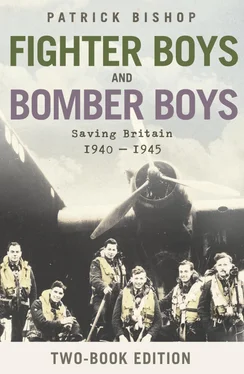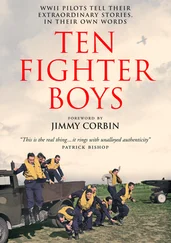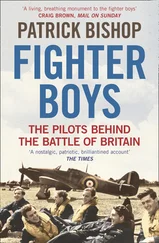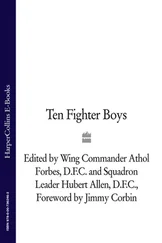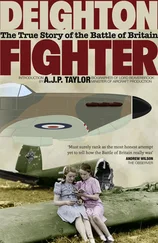Bob Doe’s father was a gardener on the Surrey estate of the editor of the News of the World. Doe left school at fourteen without passing any exams and got a job as an office boy at the paper’s headquarters in Bouverie Street. One lunchtime he walked over to the Air Ministry headquarters in Kingsway and announced he wanted a short-service commission. ‘I was passed from office to office. They were very disapproving when they found I’d passed no exams. Then I found myself in front of this elderly chap with lots of braid on his uniform and he seemed to like me.’ 16When he discovered that Doe had already joined the RAFVR and done seventy-five hours’ flying, any lack of formal education was forgotten. Doe sat the entrance exam, and with some coaching from his Air Ministry sponsor, got through. Doe’s case was exceptional. Most entrants had passed their school certificate and had gone to fee-paying or grammar schools.
One obvious source for the sort of healthy, uncomplicated, modern-minded young men the RAF was seeking was the Empire. Senior officers were sent overseas to Australia, Canada, New Zealand and South Africa to supervise selection. The decision to leave home to cross the world at a time when war seemed to be stirring again in Europe was a dramatic one. Yet the populations of the colonies felt strong sentiments of loyalty and respect towards Britain. The RAF appeal offered broader horizons to ambitious and adventurous young airmen as well as touching a sense of obligation. The response was enthusiastic. On catching their first sight of the mother country, many of them wondered whether they had made the right choice. Alan Deere left Auckland in September 1937 aboard the SS Rangitane and arrived at Tilbury docks at the start of an English winter. ‘The cold discomfort of the railway carriage and the flat, treeless acres of southern Essex were depressing reminders of the warmth and sunshine of far-off New Zealand. We stared in amazement at the grim rows of East End houses, pouring their smoke into the clouded atmosphere, and were appalled by the bustle and grime of Liverpool Street Station, so different from the luxurious gateway to the London of our dreams.’ 17
Despite the relative elasticity of the RAF approach, the selection process was thorough and demanding. After the written test and a strict medical, candidates were summoned to a board and questioned by a panel of officers. The examiners were looking for some technical knowledge and evidence of keenness. Enthusiasm for sports was usually taken as strong proof of the latter. At first, short-service entrants were sent off immediately to an RAF flying training centre, but the existing facilities could not cope with the wave of new recruits and Tedder decided to pay civilian flying schools to give ab initio instruction.
The new boys learned in two-seaters, Avro Tutors and de Havilland Tiger Moths. A first flight in the flimsy, thrumming trainers left an indelible impression, akin, as some would remember, to their first encounter with sex. Dennis David had his first lesson in a Blackburn B2 at the grandly named London Air Park, near present-day Heathrow. In reality it was a tiny grass field with a clump of trees in the centre, surrounded by houses. Many years later he ‘still [found] it hard to find the words to describe my sheer delight and sense of freedom as the little biplane, seeming to strain every nerve, accelerated across the grass and suddenly became airborne’. 18
Fantasizing about flying aeroplanes was no preparation for the reality. A few, not necessarily the best pilots, found it gratifyingly easy. Johnny Kent, an eighteen-year-old Canadian, had begun learning at the Winnipeg Flying Club, ‘and was absolutely thrilled with the experience of actually handling the controls and I managed to cope with all the manoeuvres including an approach…at the end of this first lesson I knew I could fly’. 19But many found flight in a small, sensitive aircraft unnerving. Bob Doe was ‘petrified when I first went up. The side of the aeroplane was so thin that when you banked round I was afraid of falling through it. In no way did I have an affinity for it.’ 20On Hubert Allen’s first flight as a new candidate for a short-service commission the instructor
put the Tiger Moth into a bunt [loop] and I was sick. He shouldn’t have done that, but perhaps he thought I was over-confident and needed cutting down to size. He was mistaken. I was under-confident so I probably acted the part of extrovert to conceal this. ‘Good God,’ he said, when after landing and turning off the magnetos he peered into my cockpit and noticed that I was covered in vomit. ‘I hope you’re not going to be one of those air-sick fellows…better give the rigger half a crown for cleaning up the mess.’…he strode off to the bar. 21
Even those who had flown regularly as passengers discovered that the violent manoeuvres essential to military aviation differed dramatically from the pleasant sensations of straight and level flying. Tim Vigors, a sporting young man from a landed Irish family, had been taken flying by his godmother, who was an air enthusiast, and he liked it so much he applied to Cranwell. Starting flying training he felt fearful and nauseous. As the instructor put the aeroplane into a loop, a standard, elementary manoeuvre, a ‘queasy feeling engulfed me…then the whole weight of my body fell on my shoulder harness as we turned upside down in a slow roll…fear of falling out of the cockpit eclipsed all other sensations’. 22
Initial success did not mean that progress would then be steady. Robert Stanford Tuck was a confident young man whose long face, athletic build and pencil moustache made him look like Errol Flynn. He had lead an adventurous life in his teens, escaping the mundane horizons of Catford in south-east London for a career in the merchant navy before being accepted for a short-service commission. Tuck started off well. But he found it difficult to progress beyond basics and develop the instinctive ease of handling, the feel that was essential if one was to become a serious pilot. Tuck’s cocky judgement after his first go at the controls was that flying was easy. So it is, if restricted to the basic manoeuvres of take-off, straight and level flight, shallow turns and landing. But after that the learning ladder is steep. Diving, looping and banking tightly are disorientating. Mistakes lead quickly to panic as the actions required to retrieve the situation are usually counter-instinctive. Tuck found he was the dud of his intake, snatching at the controls, over-correcting and suffering potentially fatal lapses of concentration. He began to fear that something he had come to love would be snatched away from him. It was only when he learned that flying did not require great physical effort that his performance started to improve. The secret lay in relaxation, avoiding sharp movements and settling oneself into the fabric of the machine so as to become part of its nervous system. You had to feel the aeroplane. For the fighter pilots of the First World War, buttocks had been an important sensory tool. Pilots felt they lost something when, in 1927, parachutes, which they were obliged to sit on, became standard equipment.
By the time war broke out the RAF was mass-producing officers. The privately run elementary flying training schools dotted around the country taught a basis in practical flying, with a grounding in navigation and gunnery, that prepared pupils for an advanced course at one of the RAF’s own flying training schools. The idea was that, unlike in the previous war, when half-trained men were expected to learn while on squadron duty, pilots would now arrive at their units ready for operations.
The initial flying was done in biplanes. Pupils underwent twenty-two stages of instruction, starting with ‘air experience’ – the first flip – through to aerobatics during the eight- to twelve-week course. Emphasis was placed on learning to recover from a spin, and there was a compulsory practice every week. It was the only manoeuvre, apart from straightforward flying, that was taught previous to the first solo, which came half-way through the course. Most pupils got off alone after between eight and ten hours in the air. Alan Deere was so impatient to do so he forgot the last words of his instructor to fly for only ten minutes and to attempt only two landings. ‘I was really straining at the leash by the time he had delivered these homilies and, thinking he had finished, banged the throttle open…and so into the air, solo at last. One, two, three landings, around again and again I went, the ten-minute limit completely forgotten in the thrill and excitement of this momentous occasion.’ 23
Читать дальше
